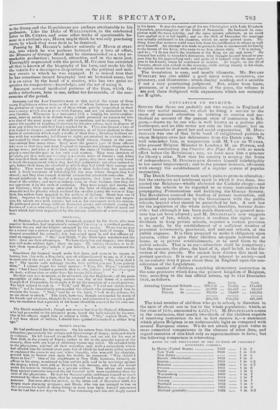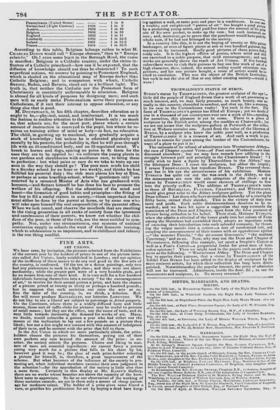EDUCATION IN BELGIUM.
SEEING that there are probably not two copies in England of this very useful manual, we shall be doing a service to the cause of national education in noticing so concise and me- thodical an account of the present state of instruction in Bel- gium,—drawn up by one who is well known as a zealous phi- lanthropist, and an able writer not only on this subject, but on several branches of penal law and social organization. M. DUC- PETIAUX was one of that little band of enlightened patriots to whom Belgium owes her deliverance from the Dutch yoke. We well remember him, in conjunction with M. VAN BE WEYER, (the present Belgian Minister in London.) M. DE POTTER, and others, as conducting the Courier des Pays Bas with so much effect before the Revolution ; nay, we have seen him a prisoner for liberty's sake. Now that his country is reaping the fruits of independence, M. DUCPETIAUX devotes himself indefatigably to her social improvement; and in the present instance, advocates with energy the establishment of a regular system of popular instruction.
The Dutch Government took much pains to promote education : but the exclusive and intolerant spirit in which it was done, dis- gusted the Belgians—wholly alienated the Catholic clergy—and caused the schools to be regarded as so many instruments for propagating Protestantism and fortifying the Orange dynasty. The Revolution restored the freedom of private instruction, and prohibited any interference by the Government with the public schools, beyond what should be prescribed by law. A new law for the regulation of the whole subject, therefore, became desir- able : but although it has been much discussed, no general mea- sure has yet been adopted ; and M. DUCPETIAUX now suggests a project of law, which, whilst it confirms the rights of in- dividuals to keep private schools, requires a certain provision to be made, by the establishment of .a sufficient number of parochial (communal), provincial, and national schools, at the public expense. It is then proposed to make it obligatory upon parents, either to give their children adequate instruction at home, or in private establishments, or to send them to the public schools. That is to say—education shall be compulsory ; but the manner, the place, the kind of it, shall be left to the dis- cretion of the parents. We cannot here discuss this most im- portant question. It is one of pressing interest to society—and in no country does it press closer than in England upon the con- sideration of the Legislature.
The number of children receiving elementary instruction in the nine provinces which form the present kingdom of Belgium, was, according to the last official return, up to 31st December 1836, as follows.
lime, Girls. Total.
Attending Communal Schools
100,1Z:6 ...
75,505 ... 175,661 Nixed do 56,900 ... 35,457 ... 92,357 Private do 78,675 ... 74,610 ... 153,285
235,731 185,572 421,303
The total number of children who go to school, is therefore in the ratio of abuut one in ten to the whole population; which, at the close of 1836, amounted to 4,225,783. M. DUCPETIAUX comes to the conclusion, that nearly two-thirds of the children capable of receiving instruction do not in fact receive it,—a statement which places Belgium in an unfavourable light as compared with several European states. We do not attach any great value to mere numerical comparisons in the absence of other data, and regard statistics of this kind only as approximations to facts; but the following comparison is interesting.
RATIO TO THE POPULATION OP THE NUMBER OF CHILDREN ATTENDING SCHOOLS.
In Maine (United States) 1833 I ha 3
New York 1834 1 in 3.6 New Jersey — 1 in z,
Zurich (Switzerland) 1832 1 in 5 Saxony 1834 1 in 5.5 Bohemia 1833 1 in 5.7 Prussia 1831 1 in 6
Baden 1830 1 in 6
Wurtenaberg 1830 1 in 7 Denmark 1834 1 in 7
Norway 1834 1 in 7
Scotland 1834 1 in 8 Bavaria 1831 1 in 8
Holland :generally) 1635 1 in 8.3
Pennsylvania (United States) 1 in 9 Switzerland (Eight Cantons) 1834 1 in 9 Austria 1832 1 in 10 Belgium 1836 1 in 10 England 1833 1 in 11 Lombardy 1832 1 in 12.6 Ireland 1831 1 in 13.2 France 1834 1 in 13.3
According to this table, Belgium belongs rather to what M. CHARLES DUP1N would call " Europe obscure," than to " Europe eclair6e." Oh 1 cries some bigot in the Borough Road, the cause is manifest : Belgium is a Catholic country, under the entire in- fluence of a Catholic priesthood—how can it be.expected, that the diffusion of knowledge should not thus be obstructed ? To such superficial notions, we answer by pointing to Protestant England, which is shaded on the educational map of Europe darker than Catholic Belgium; and in comparison with which, Catholic Saxony, Baden, and Bavaria, stand out in a brilliant light. The truth is, that neither the Catholic nor the Protestant form of Christianity is essentially unfavourable to education. Religion is abused for all kinds of purposes by designing men; and such Men will as easily make Protestantism serve their purposes as Catholicism, if it suit their interest to oppose education, or any thing else that is good. M. DUCPETIAUX, in his fifth chapter, describes education as it ought to be,—physical, moral, and intellectual. It is too much the fashion to confine attention to the third branch only ; so much so, that schools are, for the most part, places where a certain amount of instruction is conveyed to the pupil, but where he re- ceives no training either of mind or body—in fact, no education. The child, in growing up to manhood, may gradually acquire a stock of knowledge; but unless he is educated physically and morally by his parents, the probability is, that he will pass through life with an ill-conditioned body, and an ill-regulated mind. We break in horses and dogs, sparing no pains to fit them for the uses they are to be applied to: we cultivate the young plants in our gardens and shrubberies with assiduous care, to bring them to perfection : but what pains or care do we take to train up our sons in the way they should go ? The poor man sends his child to a Sunday school for an hour or two weekly, and thinks he has fulfilled his parental duty ; the rich man places his boy at Eton, or perhaps at some boarding-school, where " gentlemen only" are received by a reverend Master of Arts who has graduated with honours,—and flatters himself he has done his best to promote the welfare of his offspring. But the education of the mind and bead—the formation of good habits and principles—the fitting of the boy to fill a useful station in society,—these important duties must either be done by the parent at home, or by some one who
will take upon himself' the real responsibility of the parental office. When we look round, and observe the mischiefs that are resulting to the rising generation in all ranks of society from the ignorance and carelessness of their parents, we know not whether the chil- dren of the poor, or those of the rich, are the most entitled to sym- pathy. Nor, under any circumstances, can systems of national instruction supply in schools the want of that domestic training, which to adolescence is so important, and to childhood and infancy is the one thing needful.



























 Previous page
Previous page